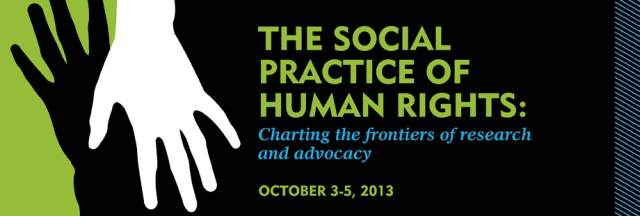Glorifying Individual Rights: Freedom of Expression, Communication Rights and Democratic Media
Location
River Campus, Room M2225
Start Date
10-4-2013 1:00 PM
Abstract
Much human rights discourse uncritically and implicitly employs the dominant focus on individual and civil political rights, tacitly diverting attention from calls from critical scholars to more fully respect social, economic and cultural rights, especially those of minority and otherwise marginalized groups. The unintended consequences of this unbalanced focus on the individual, and specifically how it manifests in the area of media and communications, are the focus of this paper.
In media and communications scholarship, this tension is obvious in the focus on freedom of expression and freedom of the press to the detriment of a broader understanding of communication rights, especially for those groups marginalized in mainstream media discourse. This broader concept includes the recognition of people’s right to access media as citizens rather than merely as passive recipients of (often state-controlled or commercial) media, and the move from an information transmission model to a relational model of media. This research compares media reform efforts in Thailand, until recently considered among the freest media environments in Southeast Asia; Burma/Myanmar, once a repressive pariah state but now cited as potentially a leading force in contemporary regional democratization efforts; and the Philippines, whose media system looks great on paper but has proven deadly on the ground. Calls for media democratization in each of these countries involve contextually and culturally specific visions for a broadened set of communication rights. The exploration of these efforts offers insights into the challenges and opportunities for promoting communication rights and other human rights in non-western contexts.
Glorifying Individual Rights: Freedom of Expression, Communication Rights and Democratic Media
River Campus, Room M2225
Much human rights discourse uncritically and implicitly employs the dominant focus on individual and civil political rights, tacitly diverting attention from calls from critical scholars to more fully respect social, economic and cultural rights, especially those of minority and otherwise marginalized groups. The unintended consequences of this unbalanced focus on the individual, and specifically how it manifests in the area of media and communications, are the focus of this paper.
In media and communications scholarship, this tension is obvious in the focus on freedom of expression and freedom of the press to the detriment of a broader understanding of communication rights, especially for those groups marginalized in mainstream media discourse. This broader concept includes the recognition of people’s right to access media as citizens rather than merely as passive recipients of (often state-controlled or commercial) media, and the move from an information transmission model to a relational model of media. This research compares media reform efforts in Thailand, until recently considered among the freest media environments in Southeast Asia; Burma/Myanmar, once a repressive pariah state but now cited as potentially a leading force in contemporary regional democratization efforts; and the Philippines, whose media system looks great on paper but has proven deadly on the ground. Calls for media democratization in each of these countries involve contextually and culturally specific visions for a broadened set of communication rights. The exploration of these efforts offers insights into the challenges and opportunities for promoting communication rights and other human rights in non-western contexts.




Comments
This biennial conference provides a unique space for scholars, practitioners and advocates to engage in collaboration, dialogue and critical analysis of human rights advocacy — locally and globally. Learn more about the Human Rights Center at the University of Dayton >>>.